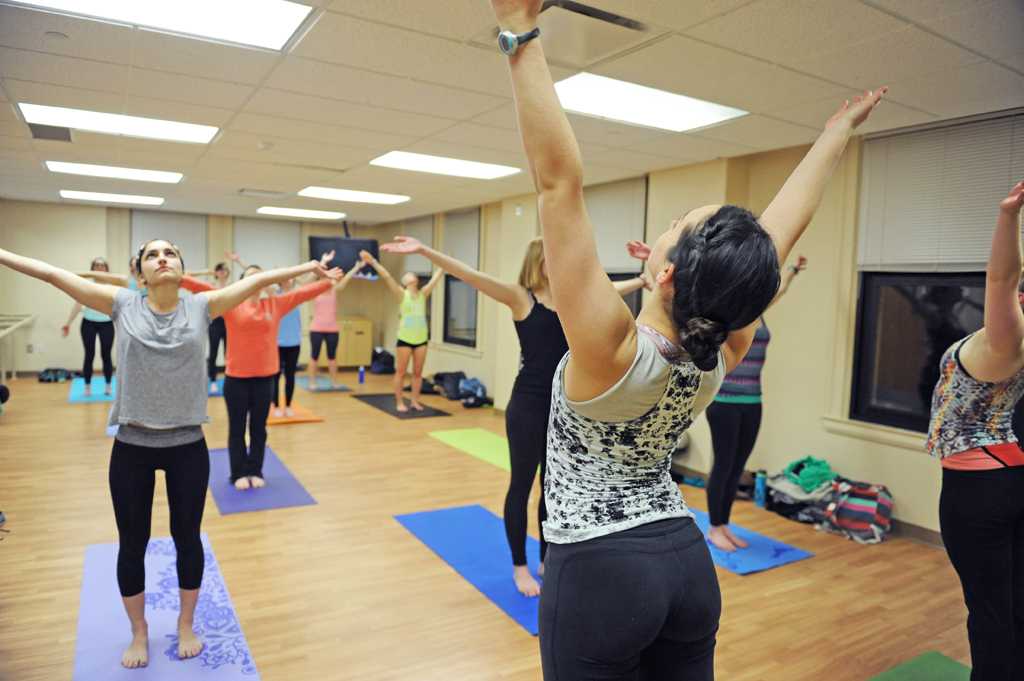Risking change: When competition or controversy strikes, yoga studios change their names


Bikram yoga has become a controversial title because of recent events. Meghan Sunners | Senior Staff Photographer
Yoga is about focusing on the moment, the pose and the current breath. But for some yoga enthusiasts, accepting the history behind a certain yoga brand is too big of a stretch.
When five women accused Bikram Choudhury — founder of the extremely popular branch of yoga, Bikram Yoga — of several instances of sexual assault, human trafficking and racist remarks last March, several studios in the country changed their names to disassociate with the founder. Choudhury is still awaiting trial, but yesterday, Bikram Yoga Squirrel Hill joined that list, effectively changing its name to I am Yoga.
“It does have something to do with that. People might think ‘Oh, I don’t support [Choudhury], so I don’t support that studio,” Rebecca Rankin, owner of Bikram Yoga Squirrel Hill, said. “We don’t really relate to that. We’re not a franchise. It was time for a more empowering name.”
According to a release from Bikram Yoga Squirrel Hill, the studio will change its name to I am Yoga to more accurately reflect its mission to create a nonjudgemental place where everyone feels welcome and empowered.
They will continue to offer Bikram-inspired yoga, which follows a series of poses in a 105 degree room to sweat out impurities while improving flexibility, but will now expand to several different types of yoga, including Vinyasa Flow, a dance-like yoga that focuses on breathing.
“We realized our name was not reflecting the inclusive nature of the studio. It was limiting,” Rankin said. “We decided to go with a more expansive name.”
According to David Kwasnick, a partner and chief creative officer for Gatesman + Dave, a Pittsburgh marketing communications agency, name changes show clientele that studios are socially aware.
For businesses that are not surrounded by controversy, Kwasnik said, creating a new title is always wrought with peril. For Kwasnick, the only right reason is to use the change to improve something for the customer’s sake.
“There has to be an operational change that filters down to products, innovation and culture,” Kwasnik said. “Changing a name is like waving a flag. Waving a flag is great, but you better have a good army behind it.”
For Sara Azarius Eichmiller, owner of Yoga on Centre, a studio on Centre Avenue that specializes in Iyengar yoga, building the size of the army is not as important as showing that your army is the only one of its kind.
Eichmiller said the company plans to change their name to Iyengar Yoga Institute of Pittsburgh to reflect their own mission of providing a different type of yoga to Pittsburgh residents.
Just like a new name can help a studio distance itself from controversy, a new name can make a studio get noticed — in a good way.
“The market is saturated with generic yoga. People are getting more discerning between this style versus that style, so I think studios have to start differentiating and being more specialized,” Eichmiller said.
Iyengar yoga is a therapeutic type of yoga that makes participants hold poses for a few minutes at a time and encourages people to listen to their body when getting into a pose. Today, Yoga on Centre is the only studio in Pittsburgh practicing this kind of yoga.
Iyengar yoga is used for therapeutic purposes for people with brain tumors, Parkinson’s disease or who are recovering from a stroke. Eichmiller said when the studio changes its name, it will also change to become a nonprofit organization to provide funding for people who can’t afford physical therapy, but need the treatment.
Eichmiller opened Yoga on Centre 11 years ago. Before that, her studio was called Shadyside Yoga and was located on Ellsworth Avenue.
“[When we opened], I used a more generic name because people weren’t familiar with different styles back then,” Eichmiller said. “But now, there are many studios with more generic mixing styles, so we are changing our name to be very clear about what we do and how it’s different from what everyone else is doing.”
According to Kwasnik, as long as there are no customer service issues and the clientele is happy, a name change should not affect the success of the company significantly.
“They’re going to the studio for the instructors, for the environment, for a place they like, and that’s much bigger than a name,” Kwasnick said. “The name changes, but the people and the experience does not.”
Recent Posts
Review | Tyler, the Creator and friends come to Pittsburgh on the ‘Chromakopia’ tour
With the release of his eighth studio album, “Chromakopia,” decorated rapper, songwriter and producer Tyler,…
A Good Hill to Die On // The motivation we all need
In this post of “A Good Hill to Die On,” staff writer Sierra O’Neil discusses…
Who Asked? // Is it really the damn phones?
This installment of Who Asked? by staff writer Brynn Murawski describes her brief journey limiting…
Students are ‘upset, but not surprised’ over denial of gender affirming care at UPMC CHP
Pitt students and LGBTQIA+ members express their concerns about the recent denial of gender affirming…
Take Madness Final Four | Battle of Pennsylvania, 412 and Just Outside of Philly clash
Welcome to the Final Four of Take Madness! We are down to four talented writers,…
Column | Best Sports Environments in Pittsburgh
Pittsburgh is undoubtedly one of the best sports cities in America. A deeply passionate fanbase…

